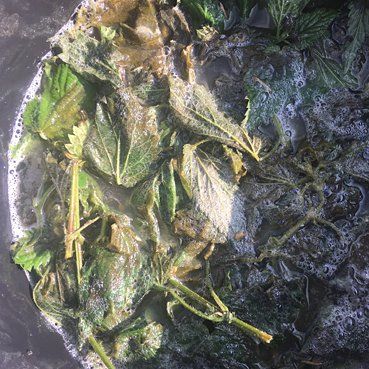do it yourself.
Start making nettle vulture yourself
Nettle vulture is a natural food source for plants and a pesticide against lice, fungi and uninvited guests.
You can probably find a lot of information about it. I will tell you here what I have used it for in recent years and how you can make it very simple yourself.
You make it in the spring, as soon as the Nettles become more vigorous (higher, darker, firmer). But before they start producing flowers (and therefore seed). Because then you spread the seeds in your garden.
You cut the young buds from this (they digest faster than the tough old leaves at the bottom). And you cut these small in a (plastic) bucket. You need about a kilo for 10 liters (1 in 10). Depending on the garden and plants that live there, you make more or less. When it is ready, use 1 liter to 10 liters of water, so a large watering can full. That quickly runs out in our garden, so I make about 20 liters. You can use it all summer long. And give to your plants weekly if you want.
But first in the bucket. It is supposed to ferment. That's why I add sugar myself. Also because the alcohol that is created as a result is not really appreciated by the bugs. About half a kilo of sugar on 10 liters. But it is also possible without sugar. The fermentation creates bubbles and if you have a lid on it you may have to put it on top or put another bucket upside down. A lid bulges, but I have not yet seen it jump off. Stir well every day. And I also add a scoop (handful) of lava flour or other rock flour. This makes it richer in minerals and smells less. Because it does ...
After two to four weeks of stirring, the fermentation process is complete and you can strain it and store it in bottles.
You use 1 liter of slurry on 10 liters of water which you can pour on the soil around your plants or spray on the leaves with a sprinkling thing.
Onions and legumes are not very fond of it. But tomatoes, cabbages, leeks, fruit and berry bushes like it for growth. It prevents fungi and disease because it increases the resistance of the plants. And last year the Colorado potato beetle disappeared faster than it came when I sprinkled the potato plants. Lice also get wings because they fly quickly. So I also give the rose and other perennials a nice shower (mehhhh, don't think about it ...).
Have fun creating and if you have any questions about it please let me know! Cindy

List of services
-
Nettle VultureListing 1Nettle vulture is a natural food source for plants and a pesticide against lice, fungi and uninvited guests. I will tell you here what I have used it for in recent years and how you can make it very simple yourself.
-
Nettle OintmentListing 2Nettle sting, mosquitoes, bees and wasp sting, all stings, all burns, acne, dirty wounds ... smear it with your homemade nettle ointment. Difficult? Not at all!
-
St. John's OilListing 3Making delicious oil yourself doesn't have to be complicated at all. The moment of harvesting your herbs is especially important and the quality of your oil and the amount of solar power that you have at your disposal.
-
Herbal tinctureListing 4A tincture is an infusion of the herbs. The active substances or constituents are absorbed by the alcohol. This gives you a mother tincture that can be kept for a very long time (years).
-
Herbal Cough SyrupUche, uche uche ... You just make a cough syrup from herbs yourself. Beneficial and delicious!
-
Iced teaMaking iced tea yourself is actually too simple for words. You make strong tea from herbs / tea that you like, let it cool down, add sugar (preferably not) or honey (better) and a handful of ice cubes.
-
Flower butter
You only need a few ingredients for this simple flower butter. Basically, you can already get started with a packet of real butter at room temperature and some beautifully colored flowers from your garden.
-
Elderflower waterUhhh ... this one is going to be really short. And powerful. Because Elderflower is resistance and makes you stronger from within. It is a blessing for starting flu symptoms such as a sore throat and cough.
-
Spring TeaSpring is the time of the year to drain the remnants left in your body from the winter. And that can be done very simply with herbs. And maybe they (or some of them) are just growing in your own garden.
-
Natural DeodorantOh how happy I am with this recipe for making your own deodorant! So simple and it works great! Completely mess-free and super cheap.
-
Anti-Mosquito
You can distract them by placing strongly scented plants around your patio. Plants like Lavender, Lemon Balm, Lemon Geranium, Sage and Rosemary.



